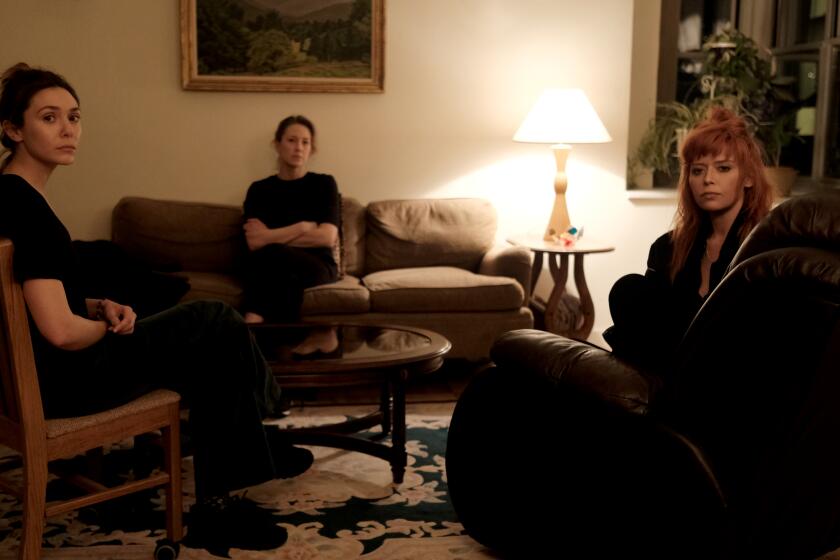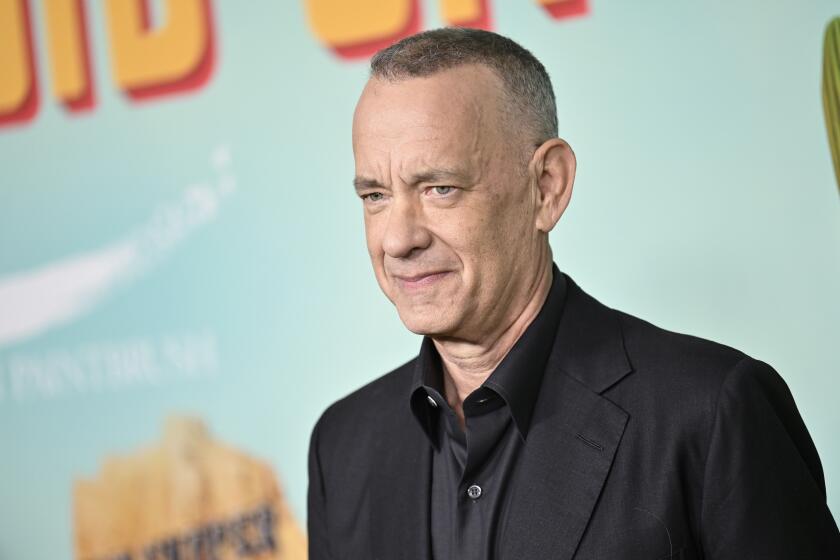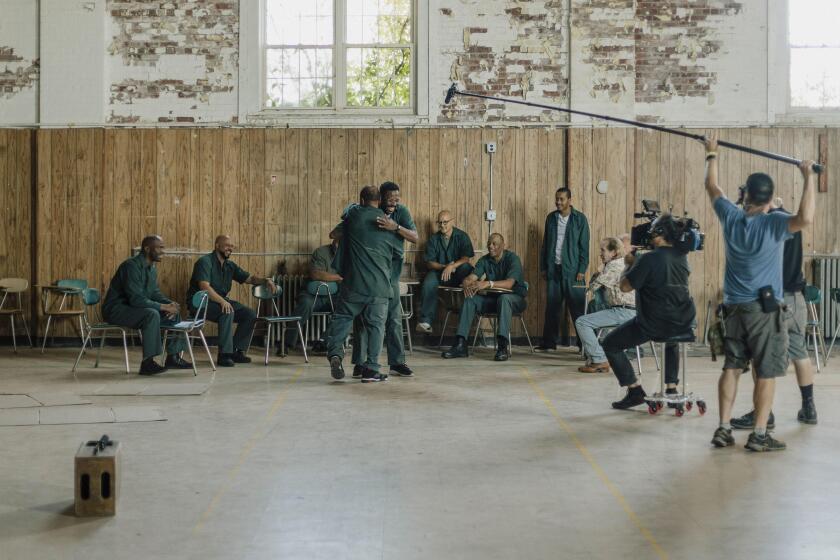She knows the territory
POOLSIDE, in a private cabana, wearing big, dark glasses and a sundress, Julie Delpy is talking. Her French accent, the bright white patio and the blue, rippling pool water conspire to provide an illusory Mediterranean mood to what is actually just a hotel in Westwood. As well-groomed bathers and wait staff float by on the mild air, Delpy leans in and begins railing against the evils of jealousy.
“Jealousy is always negative,” she says. “To be with someone jealous is the worst thing. It’s like the worst feeling in the world, and it’s suffocating. I’ve experienced men that are jealous. I don’t really feel jealousy. I think it’s cute when men flirt with other women.” When Julie Delpy talks, she trails off from one idea and segues into a variation on a similar theme and keeps going, assuming that you’ve gotten the gist without exactly wrapping up a single sentence.
It makes sense.
She knows all about the potential minefield of two people, just talking.
She was nominated for an Academy Award for best adapted screenplay, along with co-star Ethan Hawke, director Richard Linklater and original story author Kim Krizan, for “Before Sunset,” the sequel (of sorts) to “Before Sunrise.” Both films feature Delpy’s Celine and Hawke’s Jesse working their way into and out of intimacy, rejection and back again, all through increasingly complex and continuous conversation.
It’s within the tradition of those films (and maybe the epic dialogue of something like Bergman’s “Scenes From a Marriage”) that Delpy’s directorial debut, the English-French “2 Days in Paris” (she also wrote the screenplay and much of the music for the film, which opens in L.A. Aug. 10), falls -- pitting male and female against each other, armed only with whatever they can think to say in the moment. Defensive, offensive, oblique or blunt, the verbal shadowboxing of Delpy and co-star Adam Goldberg in “2 Days” will ring true for anyone who’s ever tried to understand and be understood in the struggle to serve a shaky romance.
But for now, she’s still got jealousy on her mind. “It’s not very cute. It’s cute when it’s fake, when it’s not a real jealousy,” she continues. “When it’s like, ‘Oh, sweetie, don’t talk to this guy. I’m your man.’ It’s kind of sweet, when it stays like that. When it’s real jealousy? You know the other person is suffering. It’s not nice, because you don’t want to be in a relationship when someone else is suffering.” And Goldberg’s Jack suffers.
On a trip to Europe with Delpy’s Marion in an effort to recharge their romance, things go a bit astray. We learn early on that the portion of their travels before Paris, in Venice, involved Jack’s bout with food poisoning and a sinus infection, preventing any sort of physical intimacy.
By the time they get to Paris, a healthful Jack has a go in the sack, only to be derailed by a European condom he finds too restrictive, prompting him to announce, “Is this a kids-size condom? Do they make condoms for kids?”
“The whole film is about torturing him, literally,” she says, smiling. “And that’s why I chose Adam, because he looks so funny when he’s sad and upset. That’s the main reason why I wrote it for him, is that he has that sad-clown quality.... It was fun to torture him.”
The film follows the couple through the famed city of romance while Marion runs into not one, not two, but three ex-lovers, sending Jack into a tailspin of doubt and distrust. Not to mention the utter bewilderment (on top of the language barrier) he feels in the presence of Marion’s unconventional parents played by Delpy’s actual mother and father. (Her real sister also appears in the film, playing Marion’s sibling.) The film skips through cliches without falling victim to them and somehow deals playfully with heavier themes such as terrorism, capitalism, racism and something called the Collective Dynamic of the Small World Network.
“It’s the six-degrees-of-separation theory -- every single person is connected and that there’s no such thing as chance. There’s only a small world network of your sex life. [Marion and Jack] basically bump into probably the only three ex-boyfriends she has in Paris. But she happens to bump into each of them. When bad things happen, one after another, it seems so real. It’s happened to me so many times. It’s like one bad thing, one bad thing, one bad thing.”
With “2 Days in Paris,” Delpy is enjoying a turning point in a career that’s had its own small share of bad things, not much more or less than any other working actor but enough to see the now-37-year-old craving more work behind the camera than in front.
After she starred in the second part of Krzysztof Kieslowski’s revered “Three Colors” trilogy, “White,” in 1994, the late legendary Polish director encouraged her to learn directing, properly.
“I spent a lot of time talking to Kieslowski and he knew I wanted to direct because I had written a screenplay already when I was 17 that I didn’t get a chance to make,” she recalls. “He advised me. He said, ‘You should go to film school if you want to direct. You should really do it.’ So I went to New York to study. And I did learn things. What’s interesting is that when you go to film school, it’s pretty clear if you can handle directing a movie or not. Because it’s a lot of work.”
Although she studied cinema and screenwriting at New York University, Delpy acted in more than 40 films before getting behind the camera for “2 Days.” Yet it’s while she’s directing that she feels most comfortable.
“It’s funny, because as an actress I’m a mess. I feel totally insecure. I’ve been doing it for 20 years, but I don’t know what is going on every five minutes. I’m lost all the time. But as a director, I feel like I could be doing it for the rest of my life without even blinking.”
Her next film as director, “The Countess,” which she also wrote and stars in, has recently secured financing. She’s lined up most of the cast and is hoping to begin shooting in the fall. Delpy stars alongside Radha Mitchell, William Hurt and Vincent Gallo and has landed Benoit Debie, the Sundance-award-winning cinematographer for the thriller “Joshua.” Ondrej Nekvasil, the production designer from “The Illusionist,” and Pierre-Yves Gayraud, the costume designer from last year’s “Perfume,” are both on board to lend credibility to Delpy’s small-budget period piece.
“We have lots of good, good people involved,” she says. “It’s a drama. It’s about murder, cruelty and vanity. It’s 16th century. It’s a very dark movie. It’s very different.”
While Delpy seems deep into the next phase of her career as a writer and director, the fragility of her newfound and hard-won status is not lost on her.
“I wrote my first screenplay at 17, and I directed my first film at 36,” she says, pausing. “I’ve shopped around many screenplays that people liked, but there’s a stigma about women not being capable, not having the strength to do a movie from beginning to end. If you see a woman director and she fails on one movie and it doesn’t do well, it will take her 10 years to do another film.”
With “2 Days in Paris” being followed closely by “The Countess,” Delpy has every reason to shrug off any lingering pessimism, for the time being at least.
“I’m very excited,” she says, wide-eyed, glasses off now as the sun disappears behind the monolithic 16-story hotel. “I can’t wait to be doing my next film. If I could, if I had control over my life, I would do a movie every year.”
More to Read
Only good movies
Get the Indie Focus newsletter, Mark Olsen's weekly guide to the world of cinema.
You may occasionally receive promotional content from the Los Angeles Times.








